#knottys math
Text

Visualization of the Rubik's cube
#permutation#permutations#groups#group theory#rubiks cube#rubikscube#math#mathematics#math visualization#visualization#knottys math#math stuff#mathy stuffy#cube#hexahedron#combinatorics
15K notes
·
View notes
Note
Extremely specific assumption: your love language is quality time
Ok I was so intrigued by this one, thinking "yeah, I do in fact enjoy handing out with someone and I like spending time with people I love" but also "idk I also don't know if that's my all-time favorite though." So I took the love languages quiz and here's what I got:
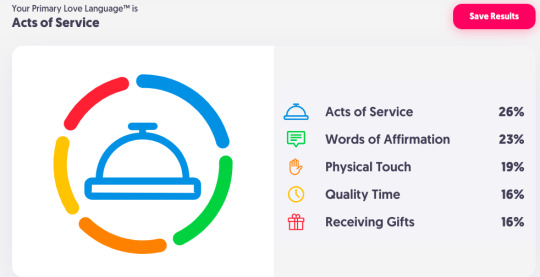
So it turns out I'm an acts of service type of person, which I think makes a good deal of sense. I really appreciate when someone helps me out, especially because I'm in like a weird season of life where the rest of my day is super stressful and it's nice to know that someone wants to make things easier on me. But idk I don't think you're totally wrong that quality time is up there, hun!
#literally learning about myself here so thank u babes#I think the last time I took this i was a physical touch and words of affirmation type of person#which made sense because tbh there is still nothing i love more in this world than being held and having my hair played with#my best friend used to scrunch my hair when i was stressed and he'd make it all knotty and messy and it was my favorite thing#and it's something i really miss now that he's gone#anyways it'd be fun if everyone took this and reported back#for science and math purposes#for imposterzoe#asks answered#about phryne
1 note
·
View note
Text
This recent post by @dagny-hasshtaggart brought up some feelings that aren't really related to the original point being made.
One of the reasons "nerds" think through social theory in these systematic ways is because nerds are pretty much by definition people who do not have strong instincts in this area.
If you are good at, say, mathematics, you will have these "eureka!" moments; you'll just suddenly understand how to go about solving what was previously a knotty problem, and, if asked to explain how you got there, may have trouble explaining it other than that "the thought comes when it wills," as Nietzche said.
Some people don't tend to have nearly as many of these "eureka!" moments, and they probably struggle with math. Perhaps they need a lot more instruction to understand math than some other people, and maybe they will never achieve the deep understanding that allowed some few mathematicians to transform society.
Nonetheless they probably can learn some basic, or perhaps even fairly advanced math, if it is laid out systemically?
But people really rebel when I suggest that social behavior might work the same way, that a person without the instinct for it might nevertheless learn to get along well enough through directed practice.
In fact, I feel that right now society believes two things simultaneously:
That the social norms and niceties of traditional society are no longer morally justifiable or even practical on the base level, and society must engage in a radical reinvention of its social norms;
Social behavior exists only as a kind of eruption of pure instinct, and cannot really be taught as a skill; success in the social realm depends entirely on preconscious processes that aren't subject to rational thought or systemization.
And if you think that it would be incredibly disconcerting and difficult to believe both of those things at the same time, then congratulations on getting my point and thank you for coming to my ted talk.
When I talk about mainstream pop feminism, like I did below, I never know whether to include my personal reasoning. On the one hand, personal examples bring things into the concrete world, on the other hand, I feel like the sympathy I get, (Which I appreciate, but I have other issues besides just feminism) sometimes gets in the way of something that I deeply want other people to understand.
Which is that the kind of mainstream feminism espoused by your favorite podcaster and retweeted by your friends and repeated on tv shows is even more schizoid about this stuff then most of the rest of society.
This is a movement that (I have recently been reminded) spread the hashtag #TeachMenNotToRape a few years back and which is also, in my experience, completely and utterly at a loss when confronting a man who says, "I'm scared to express sexual desire because I don't feel like I know enough about consent to be sure that I'm actually getting it."
The reason you want heuristics, or rules, or whatever, is that they let you reason about unfamiliar situations.
Like, say I see an attractive girl at the bar and go over and ask for her number, and she feels creeped out by me. Almost everybody I've talked to says, "Well, you can accept those feelings with grace and respect them, but you can't take responsibility for somebody else feeling creeped out, that doesn't mean every woman you meet in a bar will feel that way."
But on the other hand, say I see an attractive girl in headphones riding the bus with me, should I go up and ask her for her number? Well, most people say, "Well, no, in that case most women would be really irritated and even creeped out, and since you can predict that you have a responsibility not to act that way."
The reason some nerd might want more than that is because, you can't make an exhaustive list of every situation, right? If I'm on a cruise ship or a see a cute cosplayer at a con, is that more like the bar situation or more like the bus situation?
Here's a conclusion I came to about ten years ago,
"Well, allistic people have a magical instinct that lets them know when those kind of expressions of attraction are okay and when they aren't. The reason I don't know which is which is because I'm autistic. And since I really don't know which situation is which, the only respectful thing to do is to never risk being wrong. But that shouldn't matter right? Because Women Like Sex As Much As Men Do(tm) so eventually, since I'm going to parties and hanging out in really progressive spaces, women will ask me out pretty often and then I won't have to take those risks of hurting people."
This is where my allistic, feminist friends just grab the bridge of their nose and have to go, "Well, no, it doesn't work that way, I mean, those are things that I say all the time and you should still believe them, just not in this context, so-"
And that just kicks the can down the road, right? Now my new question is, "How do I tell the feminist advice that every guy should follow apart from the stuff that's meant for like, the alpha male creeps but not for me? And isn't it still really really dangerous for me to mistake one for the other?"
At which point they try to fob me off onto a therapist because I'm obviously a hopeless case.
And I guess I have two points:
The first is, how is a movement where so much of the verbiage is about "teaching" men so entirely unprepared to teach men how to do anything? Doesn't anybody but me find that completely remarkable?
Second, the thing that unites a ton of counter-feminist movements is not "men just want an excuse to be sexist" nor is it that those movements are "more logical" except maybe in the very limited way that they are concerned with collapsing that schizoid mental state where men must, and yet cannot, be taught.
They offer heuristics and ideas that allow men to make systematic sense of the parts of the world that they do not otherwise instinctually grasp. This can be done in a positive way which looks honestly at the world or in a deeply toxic and negative way based on completely untrue premises (e.g. radical inceldom) but I'm not convinced it can be done at all in the context of mainstream feminism.
You can't tell people that they need to go elsewhere for instruction and then be surprised and offended when they do so!
40 notes
·
View notes
Note
HI HELLO do you remember that au we played with with the yoga class + assassins !!!!!
Boy do I remember yoga class assassins! Thank you for this, truly, thank you.
[This is part of an AU ask game, send me an AU and I'll tell you five facts about it... or ramble extensively under the guise of telling you five facts, who could say?]
Yoga Classassins basic premise: Taako is a yoga teacher who specialises in assassins. In, and within a mile radius of his studio is neutral ground. No fighting, no murdering, just stretching out all the murder limbs because they're knotty from skulking, crouching in wait, and lying on cold roofs wiith sniper kit.
1) Kravitz starts coming to class because his shady organisation stopped paying for the fancy gym he liked and this is the only place that has any classes which fits his schedule and they're all Taako's. He's right grumpy about it because he's used to doing really intense HIIT classes and smashing the fuck out of punch bags. Then he sees the teacher and, surprisingly, he decides he might quite like yoga actually... and maybe that Zumba class he mentioned doing...
2) Taako has a policy about not hitting on his students ever, no matter how beautiful they are. No matter how much he definitely knows they're checking him out. He's not sure he trusts himself to correct Kravitz's posture etc. without it feeling skeevy, so he does it minimally and Kravitz (mistakenly) thinks he's super good at yoga.
3) Taako's classes have a very loyal following because a limber assassin is a less injured assassin. Gotta make sure you do your stretches, can't go murdering people if you have strained muscles and you're off your game. Recovery time is bounties lost! This does mean he has to be super careful about what he says. The first 'accident' sure did solve the issue he was having with his shitty landlord, but after the boss at his second job disappeared the day after he mentioned the overtime he was stiffed out of he had to caveat any minor gripe with a "no murdering anyone about it!"
4) Kravitz gets assigned a job, there's this scientist right, he's about to make a breakthrough which is going to revolutionise clean energy, a new kind of engine, it's going to dramatically reduce the need for fossil fuels.
5) He's doing his scoping work like any good assassin, and oh fuck, is that Taako? Is Taako married? Is Taako married to the guy he has to eliminate???? Wait, why is there two of Taako? Fuckballs. He already felt weird abou this one, but the pay could get him out of the game and fund Raven's community centre...
6) (Because maths isn't the boss of me) Kravitz has such a packed schedule because he helps Raven (basically his adoptive Mum although they didn't do the legal bit) and her wife Istus run a community centre which absolutely saved his life. Raven definitely knows what he does for a living but just doesn't ask about it.
#Thanks Larissa this was a delight#TAZ#TAZ Fic#AU ask game#Noodyl Writes#Maybe this one should exist for real...#Taakitz#TAZ balance#taz balance spoilers
33 notes
·
View notes
Text
By: Mark Goldblatt
Published: Feb 7, 2023
Several years ago, in the pre-pandemic world of in-person meetings, a newly hired colleague at Fashion Institute of Technology proposed an LGBT-themed sociology course before the School of Liberal Arts. This is a necessary step in getting the course approved by the college-wide curriculum committee. It’s a time for constructive feedback and occasional tweaking before the final committee vote.
It was a good course. The proposal was clear and concise, indicating not only a command of the relevant literature but a sensitivity to students’ interests, expectations, and ability to handle the workload. But I noticed an apparently minor, easily correctable issue. Among the learning outcomes listed was a requirement that students develop a greater acceptance of LGBTQ+ perspectives and rights. That struck me as problematic. I happen to think that such acceptance is a good thing, but to stipulate it as a learning outcome raises a knotty question. If a student masters the course material, turns in the required work, and passes the exams, but doesn’t exhibit that acceptance, is he going to fail?
After expressing my general admiration for the course, I raised my misgiving in the following way (and this is nearly an exact quote): “We need to keep in mind that we’re a state university. Our mission is to pursue, ascertain, and disseminate objective truth, and to equip our students to do the same. Given that mission, I don’t think we can list a learning outcome that requires students’ assent on a matter of personal morality. The other learning outcomes are fine. You don’t need that one, so I’d just cut it.” My colleague was fresh out of graduate school and not yet tenured, which (theoretically) put her in a vulnerable position. Nevertheless, she became apoplectic; so angry, in fact, that she had difficulty getting out her first sentence. “I can’t believe people still think that way!” she spluttered. “Queer Theory has deconstructed objectivity!”
Her words hung in the air as I glanced around the room. Not a single faculty member, not even those in math or sciences, seemed fazed by her categorical statement. Since I was a tenured professor, I was reluctant to debate an untenured colleague during a school meeting. So, I let the matter drop. The course was approved without revision by the School of Liberal Arts, and went on to gain approval by the curriculum committee. And that is how my college got into the business of winning converts.
That moment haunts me as I begin my final semester before retirement—not only because faculty on the state payroll have deliberately crossed the critical line from pursuing the truth to professing The Way, but also because the Enlightenment sensibility that finds such mission creep objectionable seems to be passing from the scene. The “deconstructive turn”—as the critic Christopher Norris once called it—is nothing more than a verbal sleight-of-hand. It invites us to tease out secondary and tertiary senses of words to show how a text contradicts what it seems to be saying, free-associate our way to philosophical banalities or outright non-sequiturs, and finally glaze the mishmash with a layer of impenetrable jargon. If a reader is foolish enough to attempt to make sense of what is being said, he’ll get bogged down before he can figure out nothing is being said at all.
When Jacques Derrida, the renowned “father of deconstruction,” was awarded an honorary degree by Cambridge University in 1992, 20 of the world’s preeminent philosophers—including W.V. Quine and Ruth Barcan Marcus—signed a letter of protest, in which they argued:
M. Derrida describes himself as a philosopher, and his writings do indeed bear some marks of writings in that discipline. … In the eyes of philosophers, and certainly those working in leading departments of philosophy throughout the world, M. Derrida’s work does not meet accepted standards of clarity and rigor. … M. Derrida seems to us to have come close to making a career out of what we regard as translating into the academic sphere tricks and gimmicks similar to those of the Dadaists. … Many French philosophers see in M. Derrida only cause for embarrassment, his antics having contributed significantly to the widespread impression that contemporary French philosophy is little more than an object of ridicule.
The claim that Queer Theory has “deconstructed objectivity” means only that a certain number of academic performance artists have doodled with a cluster of words related to the concept of objectivity in order to gain university employment, win friends, and influence a distressingly large number of gullible fans. But no epistemological breakthrough has come of their efforts: if it had, it would be self-refuting since it would consist of an objective truth about the impossibility of objectivity. (At a lecture I attended 40 years ago, a debonair British postmodernist stated that Derrida had shown us how it was possible to formulate a consistent argument with a contradiction in it. When I inquired how, in that case, we could recognize an inconsistent argument, the question was met with actual hisses from his acolytes. I’m still waiting for an answer.)
Objectively true statements are still made on a regular basis. The statement “Objectively true statements are still made on a regular basis” is itself objectively true. And Queer Theorists make objective truth claims all the time—as when they cite statistical evidence of harms visited upon the LGBT community or proving the reality of climate change. One of the silent faculty members at the meeting I mentioned, also near retirement, had devoted his entire distinguished career to combatting the effects of global warming. You’d think he’d be miffed at the suggestion that such effects were not objectively real. But no, he just sat in silence like everyone else.
Either he didn’t understand or didn’t take seriously the implications of what our new colleague was saying. The latter possibility seems the far likelier one. My sense, based on hundreds of informal conversations I’ve had with STEM faculty, is that people working in the hard sciences tend to roll their eyes at the alleged insights of postmodernism. They inhabit a world in which truth is still gauged by correspondence between belief and reality, and in which reality exists independently of our beliefs about it. Generally speaking, they don’t give a rat’s ass about discourse communities and meta-narratives. They want to know if the equations balance, if the instruments work, and if their hypotheses match empirical outcomes. In other words, they are interested in discovering if what they believe to be true is objectively true. They are certainly not interested in the ethnicity, sexuality, or gender identity of the people making truth claims.
Put all of that together, and you’ve got the makings of a schism. The humanities and social sciences are undergoing a mission reversion—they’re returning to a pre-Enlightenment view of the purpose of higher education. Prior to the Enlightenment, universities were sites of religious instruction that trained clergy. Harvard was founded in 1636, a mere six years after the settlement of Massachusetts Bay, to ensure that future generations of New England Puritans would be served by learned ministers. That goal is found among Harvard’s original “Rules and Precepts”:
Let every Student be plainly instructed, and earnestly pressed to consider well, the maine end of his life and studies is, to know God and Jesus Christ which is eternal life (John 17:3) and therefore to lay Christ in the bottome [i.e., at the base of the boat, to keep it steady in the water], as the only foundation of all sound knowledge and Learning.
That’s a version of what we’re seeing with the rise of the subjectivist movement in the humanities and social sciences. It is a new secular faith, a version of The Way. Instruction in radical progressive curricula is baptism by accreditation. It’s witness and testing. You gather for three hours a week to dwell in the spirit, commit yourself to individual rituals and collective causes, despair the fallen state of humanity, call out and cast out demons, immerse yourself in sacred texts and memorize venerable chants, then venture forth to spread the gospel. The end is performative, sacramental. Let me tell you the many ways you’re oppressed so that you may be a river to the masses.
Increasingly, that is the state of the humanities and social sciences at public universities in the US. Whatever you think of that development, it signals an existential crisis for higher education because instruction in the STEM fields at American universities remains traditional, objectively focused, and globally competitive. The reversion of the humanities and social sciences to religious preparation cannot coexist indefinitely with the Enlightenment mission of STEM instruction. Something has to give.
What, for example, becomes of science textbooks that report that only female mammals give birth? (Pity the poor seahorse, hitherto famous as the only species in which the male gives birth. But for how long?) You cannot be told in your morning sociology seminar that the pursuit of objectivity is an instrument of white supremacist culture, which must therefore be deconstructed, and then be told in your afternoon biology class that identical twins are objectively always the same sex.
It’s natural to expect the demand for severing ties to come from the professoriate on the STEM side, from a desire not to be sidetracked in their pursuit of objective truth. More likely, though, as evidenced by that liberal arts meeting at FIT, the demand will come from the humanities and social science side, caused by the unbearable adjacency of reality-based standards and scholarship to the postmodern insistence that the demand for objectivity is oppressive.
Entrance into STEM fields requires rigorous standards of assessment, as does progression and graduation. Rigorous standards of assessment, however, don’t produce equity or (objectively!) diverse student populations. Asian students are currently overrepresented in STEM, black students underrepresented; male students are overrepresented, female students underrepresented. According to the tenets of progressive activism, demographic imbalances of that nature constitute de facto proof of racial and gender bias since in an unbiased system every demographic would be proportionally represented. How long will student activists, encouraged by humanities and social science faculty, tolerate this alleged injustice on their campuses?
The disintegration of academia is coming. Whichever side precipitates the break, it will be a necessary development. Higher education is a serious intellectual endeavor, and nothing is less intellectually serious in contemporary academia than the suggestion that the pursuit of objectivity has been discredited. Empirical observation, mathematical inquiry, inductive and deductive reasoning, and falsifiability are the sine qua nons of higher education. As courses of study in the humanities and social sciences depart from such things, they cease to be higher education in the Enlightenment sense.
[ Via: https://archive.is/vQvgg ]
==
It's pivotal moments like this that inform what comes next. That realization something was really wrong here, with that hesitation, that second-guessing, that telling the truth might upset them, that it would just be easier to let this one slide, that instinct to just go along to get along, and the creeping recognition a group delusion was going on.
Who would have thought that the downfall of western academia could be powered by the worst, most pretentious and puerile French philosophy which can be encapulated as an academic formalization of the Equivocation Fallacy, and language games worthy of a 7 year old who just discovered a book of knock-knock jokes?
It was a mistake to think that nobody would take this seriously. It was a mistake to think that it wouldn't leak out of the bogus Fantasy Studies domains within Humanities which they'd invented and credentialed themselves in. And it was damn sure a mistake to give them a seat at the grown-ups table as far as knowledge claims and knowledge production.
To paraphrase Sam Harris, those who reject objective reality belong at the margins of our societies, not in our halls of knowledge.
Denying objective reality should be regarded as an announcement they do not live in it. This is a definition of delusional, not a definition of intellectual.
#Mark Goldblatt#objective truth#objective reality#objectivity#postmodernism#deconstruction#word games#language games#language manipulation#subjective reality#lived experience#science#STEM#corruption of education#corruption of knowledge#Jacques Derrida#subjectivism#postmodern philosophy#postmodern nonsense#Enlightenment values#Enlightenment#evidence#reason#religion is a mental illness
25 notes
·
View notes
Text
melancocky & such...
i've been thinking a lot about the recent season of random acts of flyness and unsurprisingly spent more time thinking about how the episodes articulate sentient wounds; wounds sacral, psychological, physical and ancestral. it’s a little daunting there’s all these to attend to in the course of also surviving and being present. in episode 2, it names a wound persona born of the character najja, and describes sentient wounds as:
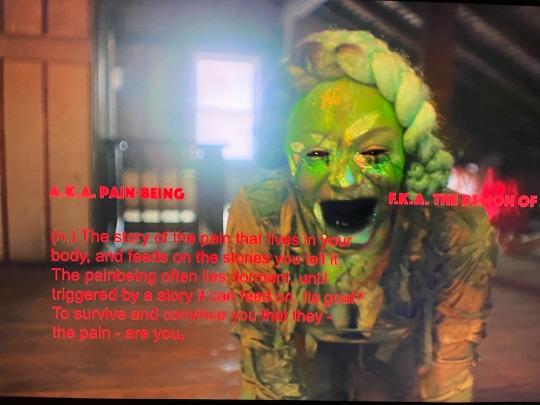
“ the story of the pain that lives in your body, and feeds on the stories you tell it. the pain being often lies dormant, until triggered by a story it can feed on. it’s goal ? to survive and convince you that they- the pain-are you.”
& in my experience, the pain, wound or lack once sentient is indeed you. it isn’t all of you, but it is you. here’s how i see it: a personal pain from just living is surviving many serious things i shouldn’t have survived alone. blessed with a sacred gift of deep knowing, or by sheer determination, i’d been working the maths to try solve the big gnawing knotty things in my body. i realized this is something that i couldn’t do alone, but despite my best attempts, what i need for that wound to seal or even be poured into seems to be delayed and denied for so many reasons that i, as whatever i is, can say okay well at least i tried, but the wounds do not care. a curse of being born from where i came is at once been so gifted as seeing things as they really are, but this way of seeing is very costly. deep knowing makes living incredibly difficult for me.
it’s an uneven double edged sword that makes me wish i could be more blissfully unaware. i don’t even know if it is me particularly or that the wounds seem to take up some of my nature automatically in being impatient and incredibly high mantainance, this high maintenance being it better be so fucking good, whatever salve, or i don’t want it. it feels like an exaggeration saying high maintenance when all it really wants is a lot of time spent with others and a lot of physical intimacy that feels impossible(or lackluster) under capitalism. but again, the wounds don’t know this. so i’m spending the extra energy i don’t have trying to acknowledge the wound in a way or find the language to let it know that i see it and pacify it still all on my own. in my case this lack of community or space to be able to show them continue to impact the severity of the wound and by implication me. in my experience, my wounds are not dormant things that need stories to be triggered, i’m actively seeing it manifest itself daily even on somewhere as vapid as instagram 💀 which is why i’m grateful for the articulation of sentient wounds because the wounds r bloody alive.
i don’t know the extent of control we have with our wounds, but i find it very important roaf2 has named it sentient because i’m seeing how it changes me. najja as one of her sentient wounds, celine, in the couple’s therapy scene talks about how celine protects najja, as well as other qualities that makes it impossible for najja to hate celine. i don’t hate my wounds, infact i tend to take a nurturing role with it and let it misbehave and get nasty and not feel a hey don’t do that role with it. i enjoy some of the changes this wound is bringing, i sure do need to get cockier, i sure do need to remember how loud it demands, how it recoils at lowly offerings, how it spits on plastic, i sure need to be more proud of myself 4 surviving the things—it says i am a formidable bitch because it is.
& as for the less desirable changes like xxxxx, xxxxxxxxxxxx, xxxxxxxxxxx, we’ll see about that in the letting go portion of the healing rituals. for now i let it rage. 🌺
3 notes
·
View notes
Text
idk what to do anymore . I am just so miserable. I haven't got out of bed yet and am meant to be doing maths. but I just don't care anymore. and my hair is full of knots because I'm too depressed to take care of it and then it hurts and it makes me more depressing knowing I look awful and I am awful. and I don't own anything I can wear to actually just go out on a walk with my family so instead I sit and rot in my pajamas unless I have to go to work in which I wear an awful uniform with my knotty awful hair in a bun, hoping no one can see it.and I'm just at my wits end. I just want my life to be over
3 notes
·
View notes
Text

I can't even remember why I posted this, except it a wooden bike just looks like fun to log on and go. Wanted to grab the bike and ride away, but didn't want to be knotty, so I thought I'd merely branch out from my regular roots and leaf the familiar behind.
This bicycle comes from a woke spruce and loves math, always saying "Gee, I'm a tree."
But would wood go round in circles?
Dunno. I'm stumped.
0 notes
Text
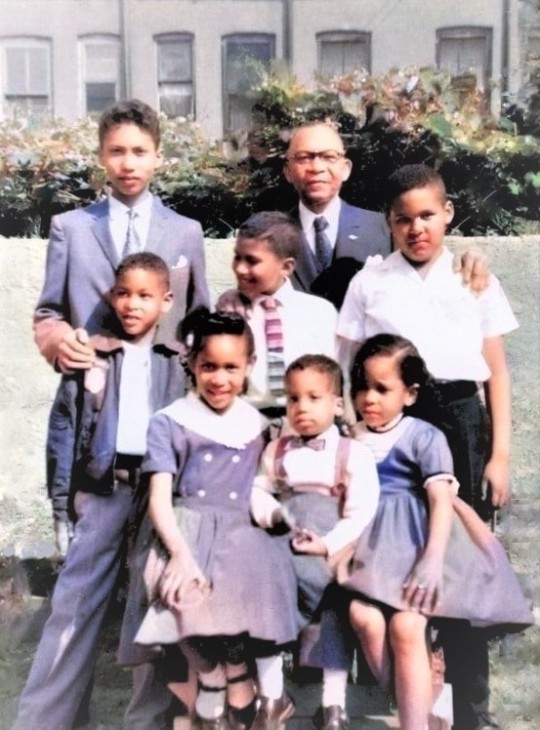
FB memory. My cousin Henry Branker's father Uncle Clyde was a soft drink distributer. He also built a knotty pine basement in which we all played. Cousins' Henry Daryl and I built model planes and cars down there. It had a soda machine too. A gang of 10-year-olds, and a free soda machine...do the math. Us in Uncle Clyde's Queens backyard.
There's left to right top. Cousin James, and my maternal Grandpa. Lower me then Cousin Henry, and my big brother John. Below dear cousin Sandra her brother Daryl, and my good sister Sylvia. This in 1959 more or less. The days of our lives.
0 notes
Text
Great stellated dodecahedron

For that Kepler-Poinsot-Polyhedron I started to draw an icosahedron and continued to add triangular pyramids as "hats" on top of each of the 20 triangular icosahedron faces.
- - -- ---
This is the Small Stellated Dodecahedron I drew a while back:

- - -- ---
How are the Dodecahedron, Icosahedron, Small and Great Stellated Dodecahedron related?

(Source)
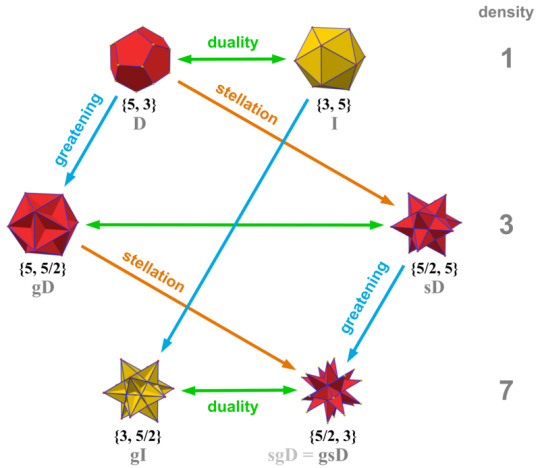
Truncation of the Small Stellated Dodecahedron:

Truncation of the Great Stellated Dodecahedron:

#kepler-poinsot-polyhedra#polyhedra#polyhedron#shapes#shape#stellated#stellated polyhedron#geometry#mathy stuffy#mathy#math#artsy math#artsy mathy#knottys math#kepler-poinsot-polyhedron
128 notes
·
View notes
Text
Looks like a toy for playing around with some knot theory stuff

The numbers can be re-attached via velcro patches.
One can use the threads/shoelaces for playing with some weaving patterns. Additionally one can use the slilicone pop-up dots as a binary/boolean indicator, which might be a good helpful tool.
Due to material reasons this thing only has 9 columns. The number 0 might get a different place or calculation mechanism.
I also still do not really know how I really want to use this strange thing.
...
A well-working flap:
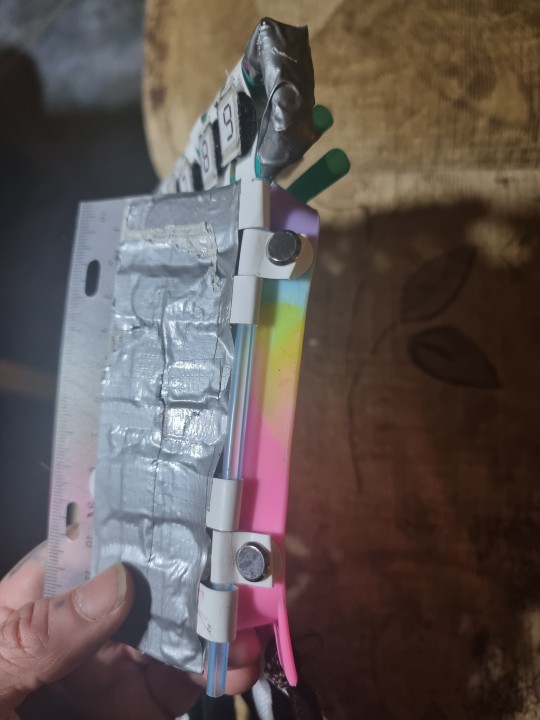


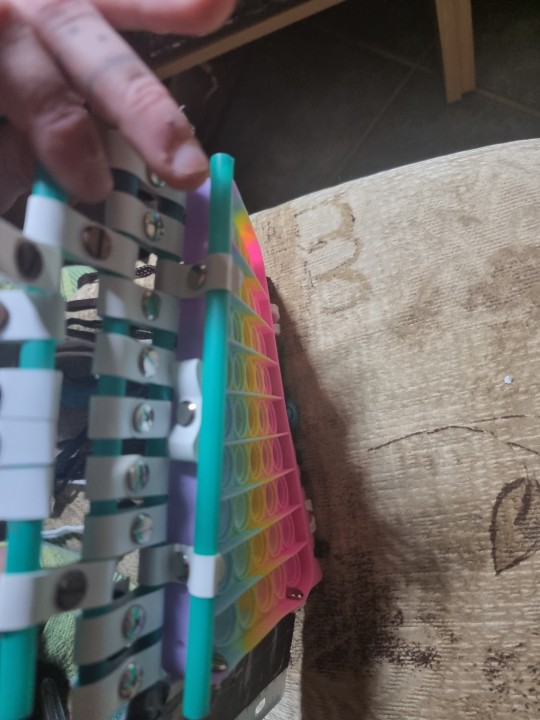
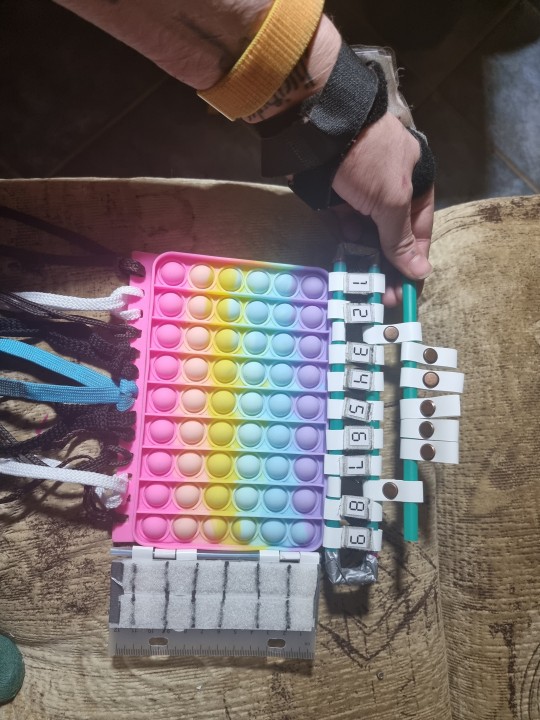
And a (useless) information for free:
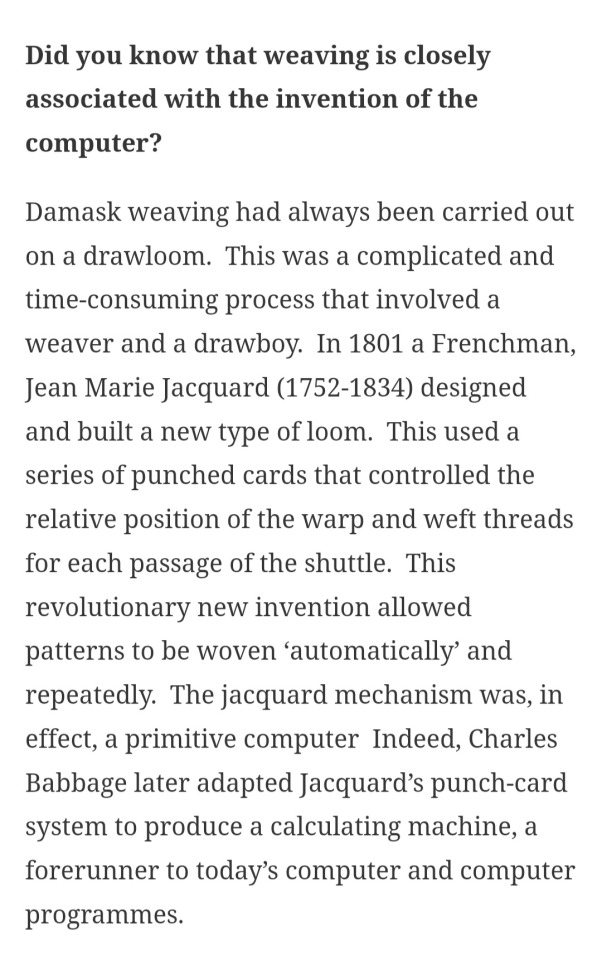
[ Source: lisburnmuseum.com ]
#kalkulationslappen 2.0#calculation rag#calculation rag 2.0#silly#semi-serious math#math#mathematics#mathposting#knot theory#knotty#knotty toy#mathy toy#autism intensifies#calc rag#whatever sort of non-trivial nonsense#threads#weaving#computer#cs#computer science#primitive computer#my strange silly crafts
83 notes
·
View notes
Text
Holy Red Wagon- Bruiser & Bicycle

As the 2020s continue to progress it feels increasingly apparent that the indie sleaze revivalism isn't going to die anytime soon. For every great record that draws from anything even remotely in this realm (this year's example being Dogsbody, the excellent debut LP by Model/Actriz) there are dozens more that aspire to the hedonistic highs of Brooklyn's mid-aughts DFA greats without any of the ingenuity, talent, or personality of bands like Black Dice or Liars. While it's hard to say what indie micro-trend will be "revitalized" with any real kind of legitimacy through the lens of nostalgia cycles next, Albany's Bruiser & Bicycle make a strong case for a return to the freak-folk of the mid-aughts. While the vocal mannerisms of Bruiser & Bicycle may never escape those Animal Collective comparisons (while sonically there are shades of mid aughts art rock outfits like Deerhoof, Battles, Ponytail, etc) their imaginative 2nd LP, Holy Red Wagon, is far more than just a pastiche of yesterday's arty Brooklyn touchstones. On HRW, B&B draw on a wide palette of experimental strains of rock and pop, but sound beholden to no one but the vast expanse of their whims alone.
B&B began as the duo of songwriters Nick Whittemore and Keegan Graziane, and their 2019 debut, Woods Come Find Me, struck much closer to freak-folk proper with wispy song structures, propulsive acoustic guitar strumming, cavernous reverb, and a plethora of negative space. For HRW they recruited Joe Taurone on drums, which naturally added quite a bit of comparable heft and dimension to these songs, like Joe's chugging breakbeat on "Lunette Fields Speak" or his pensive snare rhythm that gives way to an infectious series of rolls throughout the hook of closer "We Thought the Sky". But the biggest leap forward on HRW in general is the widened scope of Nick and Keegan's songwriting, which doesn't entirely abandon the freak-folk stylings of their earliest work but finds them incorporating psychedelic pop, art-rock, math-rock, emo, and straight up indie rock into the fold. There are no songs shorter than 5 minutes, which comes across far more by necessity to give these ideas the space to develop than any kind of obtuse disposition. These songs are technically dazzling yet still giddy with the possibility of sound, and never come across as belabored academic exercises despite some considerable chops from the band's 3 members.
The songs on HRW are easily the most ambitious and adventurous that B&B have ever written, but the playful energy that they exude gives them an appeal far behind their considerable scope. The knotty rhythms of "Cinnabar Alter" and "1000 Engines" are complimented by bright vocal harmonies that coalesce into sharp hooks that never succumb to the weight of their complex foundations, while songs like "Rats Come to Play" and "Lunette Fields Speak" are by no means straightforward, but place a premium on the band's impressive command of melody. Opener "Aerial Shipyards" opens to a procession of wordless wails that practically beg for those AnCo comparisons, but it quickly locks into a mathy groove accentuated by brisk cowbell and finger snaps while the vocal melodies progress into a jovial sing-along that loses none of its luster throughout the song's spellbinding 7 and a half minutes. Closer "We Thought the Sky" is a steady march accentuated by rapid-fire snare fills that eventually blossoms into a psych-pop free-fall punctuated by lively vocal melodies that close things out. On HRW, B&B offer a rich sonic tapestry far beyond the rigid sonic parameters of their debut, one that gives plenty of reason to believe that they're onto something special.
Essentials: “We Thought the Sky”, “Cinnabar Altar”, “Aerial Shipyards”
1 note
·
View note
Text
Quanta Magazine
Far from being an abstract mathematical curiosity, knot theory has driven many findings in math and beyond.
ToKTutor's insight:
nov2023 Q2 Knotty problems, vortex theory & 'sliceness': The mathematical elegance of a process that inspired a new branch of math knowledge...
0 notes
Text
All eyes are on the government. After three dizzying years of the Trump administration, the world was dealt a once-in-three-generations pandemic
All eyes are on the government. After three dizzying years of the Trump administration, the world was dealt a once-in-three-generations pandemic
Income inequality, institutionalized racism, and all-consuming capitalism came under closer scrutiny than time had previously permitted. Now more than ever (a phrase which seems to be used now more than ever,) voters are energized to exercise their vocal civic duties.
Brittanye Morris is a politician who works for those people.
Morris is currently running unopposed to become the Democratic District Court Judge for Texas’s 333rd District. As governmental change has permeated the popular lexicon more intensely, citizens have become more aware of the crucial role local government plays in shaping the realities of daily life. In her seat, Morris will oversee civil cases — disputes between citizens and organizations, like foreclosures.
Texans for Lawsuit Reform, a “non-profit research organization that provides objective analysis of the challenges presented by the Texas civil justice system,” notes the difficulties of this system which its participants inherit. In The Texas Judicial System: Recommendations for Reform, the organization writes that district courts, “which are the trial courts of general jurisdiction, sit in a spider web of districts having overlapping geographic boundaries. Often a single county is in two or three district court districts, with each of those districts being comprised of a different group of counties. This knotty trial-court structure is arcane and inefficient, and it invites forum shopping.”
The organization continues, “Among the structure’s many failings is the inability to effectively handle complex civil cases, which require significant and specialized judicial resources. While the federal court system and the court systems in other major states have special courts or procedures to handle complex or specialized litigation, Texas does not. Consequently, complex litigation in Texas often is conducted in trial courts lacking the knowledge or resources to handle that litigation.”
Morris brings fresh eyes, grit, and a wealth of life experience to this complicated position. Her website states that she is a Houston native “born and raised in a middle class household.” Her mother was employed as an educator in the public school system, is father is a retired police lieutenant. As a child, Morris was very active, participating in everything from debate to girl scouts. “I grew up in a very diverse area,” Morris told me. She was was a conduit to this variety, diversifying her interests and activities to occupy every arena.
Morris earned her Bachelor’s in government history (fact check) from University of Houston, and then a juris doctorate from from Thurgood Marshall School of Law at the prestigious Texas Southern University. “I guess I gravitated to it because it made sense,” Morrise mused, contemplating her interest in the major. “There’s a certain continuity to history, like math. It gave you a sense of understanding about backgrounds and about the formation of things. Government segued nicely into that because so much of history is surrounding the government or governmental structures.”
Her driving spirit mixed with her intellect allowed her to overcome the adversities she faced in achieving her educational goals. Morris recalled, “I actually attempted to work during law school the first year, even though it's not recommended. I nearly failed out.” While she knew her parents wouldn’t let her fail, they pushed her to earn her achievements. Morris financed her own way through law school by working at local post office for five hours most evenings.
“I realized somewhere in there that I really did like to litigate,” she recalled of the grindstone era. She learned that she liked property law, and began interning at a community college’s in-house counsel's section. From there, she worked for a bankruptcy trustee.
“During this time, he didn't have an opening for another staff attorney,” Morris intimated. In need of funds for her post-grad life, Morris took a job at the local attorney general’s office, (fact check) a position which she likened to traffic court, but collecting property taxes. “I would have stayed there, but there was no room for upward mobility,” she said. “You’re not going to get the trial experience, or you're not going to get actual litigation experience.”
“Obviously, you're not the good guy in this situation,” she conceded of the role, though she did gain an intimate knowledge of how officials can help their communities. “You have the ability to inform people to go seek counsel, or you have the ability to allow them resets that may very well save the home their grandmothers or whomever worked for.”
“I really feel like representation matters, and certain voices have been marginalized,” Morris said. Having built her own career of her own accord, she possesses all the grit and effort that endeavor requires. A life like this generally proves adventurous, experience-rich. Morris believes her background lends a core competency to her legal expertise. Rather than choosing to immediately foreclose a home, she can instead allow defendants more opportunity to recover — more time to explore options and acquire attorneys.
“I’ve been through situations to where you're working the best you can, and for whatever reason, your ends don't meet,” Morris stated, referencing her experiences working through law school. One time, she returned to her apartment to find her internet turned off. Assessing her expenses, she decided she could comfortably pay the bill. The next night, she returned home to find her electricity shut off. “That’s a different perspective than someone who had a life where things were afforded to them. You can understand the struggle,” she said. Morris asserted that judges must rule solely based on the law, and “your personal biases or prejudices do not come in, but you never leave your experiences at the door.”
Morris waited for her opportune moment to make a move on the position. “You want to be the change you want to see, of course, but to not do that in a strategic way does a disservice,” she explained. This year felt ripe with its intense focus on politics. “In our community in particular, more and more people are wanting more representation,” she said.
The hopeful political upstart faced obstacles straight away, butting heads with rigid local political structures by opposing the incumbent, a fellow Democrat. “Running against an incumbent from your same party is never a popular choice,” she allowed, matter-of-factly. Cut off from their support, she added that “You’re not going to get support from large donors or large people, because effectively you're the underdog. Very few people are willing to bet on an underdog fresh out of the gate.”
Instead, she went grassroots, an approach which made more ideological sense to her anyways. “What people tend to forget so often is that it's your community, your constituency, that gives you that seat,” Morris remarked. “It is not yours. It belongs to the citizens and the community in which you serve.”
Morris began attending town halls and civic club meetings across the county. She went to the neighborhood clubs and visited different religious organizations. “The courts are tools for the people to access justice. So in a true sense of that, then why not go into the community?” she asked.
Some people might grow jaded from opposing an opponent so imposing as their own political party, but Morris confidently assured me that she emerged from the experience with her optimism and excitement for government intact. “You can be cynical and say, ‘government sucks.’ What practical purpose is that gonna serve?” she asked. “What I took out of it is, the community will rally and people will support.”
As communities strive to establish diverse representation in their democratic systems, Morris noted, “It isn’t limited to people of African descent… Diversity is just that: diverse. We should strive to have all kinds of people on there. Our county is very diverse, very populous, so there needs to be representation of all kinds on the bench.” She brings her own experience and goals into the equation. As a District Judge, Morris intends “to create a judiciary that's going to be open, accessible, and transparent.” She also has plans to work with high schools to host teen courts and encourage students to embrace their civic duties.
Though she’s overcome obstacles from financing to party opposition, no victory has been greater than the ones Morris can claim from her own internal battles. She noted that the academic difficulty of transitioning from undergraduate to law school inspired fears, at moments, about her own abilities. “It was a really eye opening experience to question myself, for the first time, in a real candid way. I had never had adversity when it came to learning, or adversity in school,” Morris explained. “I've learned that tomorrow will worry about itself. You just have to worry about today and hope you may get to tomorrow.”
After all the strife associated with law school, as she was working in her unfulfilling post-grad role and struggling to make ends meet, Morris was also studying for the dreaded bar exam. Then she learned that she was suffering from stage four kidney failure. “Now you're studying for this bar. It's a three day test. And you're just like, ‘Oh, my gosh, what if I don't pass it?’” She recalled of her anxiety at the time. “I really had to compartmentalize everything and put all my effort into [the exam.]” Morris put the procedure off until after the bar, focusing everything she had on this final push. After passing the exam, she received her kidney transplant. “It wasn't easy by any stretch of the imagination,” she said, “but I think it's those trying times that really made me appreciate where I have gotten in life.”
I wonder how history will look back on this era. Sure, we’ll all remember the presidential elections of this past generation. Some might even remember the subtler conflicts — characters like Condoleeza Rice and James Comey and Mitch McConnell. But increasingly, as engaged citizens adopt the pragmatic approach to change which Morris has instituted in her own life, society is shifting its focus to the foot soldiers — those who run government’s daily machinations. In order for sweeping change to take shape and take root, our government needs an infusion of authenticity in the form of real people wanting to make a tangible difference. Morris is less talk and more action. She moves from a place of informed balance, equidistant from head and heart, but marrying the unique fires of both. Applied to our present context, this is the way our government was truly intended to function.
Upon contemplating how history might remember her campaign and judgeship, Morris decided, “Only history can dictate that. When you think about like the Great's of our time, they weren't that at the time.” While she doesn't consider herself the equivalent to a Malcolm or a Martin, she did note, “It wasn't until long after them leaving this earth that they both became historical icons.” As always, she focuses her energy where it’s feasibly useful instead. “For me, it's very important just to live in a way that I'll be proud of and my children will be proud of.”
While her career has proved momentous in its completely individual way, Morris believes the type of success she now enjoys is accessible to anyone, provided they’re prepared for a non-linear route. “Be open,” she espoused. “That’s the biggest advice I can give to anybody. I think we get so set on where we want to go that we aren't open to any opportunities and possibilities. It’s those opportunities, those possibilities and those twists and turns, that get you where you ultimately need to be.” Morris’s own life has already taken her so far, and she hasn't even graduated from her twenties. She is a force to watch, a flame ready to multiply.
Brittanye Morris Texas
0 notes
Text
All eyes are on the government. After three dizzying years of the Trump administration, the world was dealt a once-in-three-generations pandemic
All eyes are on the government. After three dizzying years of the Trump administration, the world was dealt a once-in-three-generations pandemic
Income inequality, institutionalized racism, and all-consuming capitalism came under closer scrutiny than time had previously permitted. Now more than ever (a phrase which seems to be used now more than ever,) voters are energized to exercise their vocal civic duties.
Brittanye Morris is a politician who works for those people.
Morris is currently running unopposed to become the Democratic District Court Judge for Texas’s 333rd District. As governmental change has permeated the popular lexicon more intensely, citizens have become more aware of the crucial role local government plays in shaping the realities of daily life. In her seat, Morris will oversee civil cases — disputes between citizens and organizations, like foreclosures.
Texans for Lawsuit Reform, a “non-profit research organization that provides objective analysis of the challenges presented by the Texas civil justice system,” notes the difficulties of this system which its participants inherit. In The Texas Judicial System: Recommendations for Reform, the organization writes that district courts, “which are the trial courts of general jurisdiction, sit in a spider web of districts having overlapping geographic boundaries. Often a single county is in two or three district court districts, with each of those districts being comprised of a different group of counties. This knotty trial-court structure is arcane and inefficient, and it invites forum shopping.”
The organization continues, “Among the structure’s many failings is the inability to effectively handle complex civil cases, which require significant and specialized judicial resources. While the federal court system and the court systems in other major states have special courts or procedures to handle complex or specialized litigation, Texas does not. Consequently, complex litigation in Texas often is conducted in trial courts lacking the knowledge or resources to handle that litigation.”
Morris brings fresh eyes, grit, and a wealth of life experience to this complicated position. Her website states that she is a Houston native “born and raised in a middle class household.” Her mother was employed as an educator in the public school system, is father is a retired police lieutenant. As a child, Morris was very active, participating in everything from debate to girl scouts. “I grew up in a very diverse area,” Morris told me. She was was a conduit to this variety, diversifying her interests and activities to occupy every arena.
Morris earned her Bachelor’s in government history (fact check) from University of Houston, and then a juris doctorate from from Thurgood Marshall School of Law at the prestigious Texas Southern University. “I guess I gravitated to it because it made sense,” Morrise mused, contemplating her interest in the major. “There’s a certain continuity to history, like math. It gave you a sense of understanding about backgrounds and about the formation of things. Government segued nicely into that because so much of history is surrounding the government or governmental structures.”
Her driving spirit mixed with her intellect allowed her to overcome the adversities she faced in achieving her educational goals. Morris recalled, “I actually attempted to work during law school the first year, even though it's not recommended. I nearly failed out.” While she knew her parents wouldn’t let her fail, they pushed her to earn her achievements. Morris financed her own way through law school by working at local post office for five hours most evenings.
“I realized somewhere in there that I really did like to litigate,” she recalled of the grindstone era. She learned that she liked property law, and began interning at a community college’s in-house counsel's section. From there, she worked for a bankruptcy trustee.
“During this time, he didn't have an opening for another staff attorney,” Morris intimated. In need of funds for her post-grad life, Morris took a job at the local attorney general’s office, (fact check) a position which she likened to traffic court, but collecting property taxes. “I would have stayed there, but there was no room for upward mobility,” she said. “You’re not going to get the trial experience, or you're not going to get actual litigation experience.”
“Obviously, you're not the good guy in this situation,” she conceded of the role, though she did gain an intimate knowledge of how officials can help their communities. “You have the ability to inform people to go seek counsel, or you have the ability to allow them resets that may very well save the home their grandmothers or whomever worked for.”
“I really feel like representation matters, and certain voices have been marginalized,” Morris said. Having built her own career of her own accord, she possesses all the grit and effort that endeavor requires. A life like this generally proves adventurous, experience-rich. Morris believes her background lends a core competency to her legal expertise. Rather than choosing to immediately foreclose a home, she can instead allow defendants more opportunity to recover — more time to explore options and acquire attorneys.
“I’ve been through situations to where you're working the best you can, and for whatever reason, your ends don't meet,” Morris stated, referencing her experiences working through law school. One time, she returned to her apartment to find her internet turned off. Assessing her expenses, she decided she could comfortably pay the bill. The next night, she returned home to find her electricity shut off. “That’s a different perspective than someone who had a life where things were afforded to them. You can understand the struggle,” she said. Morris asserted that judges must rule solely based on the law, and “your personal biases or prejudices do not come in, but you never leave your experiences at the door.”
Morris waited for her opportune moment to make a move on the position. “You want to be the change you want to see, of course, but to not do that in a strategic way does a disservice,” she explained. This year felt ripe with its intense focus on politics. “In our community in particular, more and more people are wanting more representation,” she said.
The hopeful political upstart faced obstacles straight away, butting heads with rigid local political structures by opposing the incumbent, a fellow Democrat. “Running against an incumbent from your same party is never a popular choice,” she allowed, matter-of-factly. Cut off from their support, she added that “You’re not going to get support from large donors or large people, because effectively you're the underdog. Very few people are willing to bet on an underdog fresh out of the gate.”
Instead, she went grassroots, an approach which made more ideological sense to her anyways. “What people tend to forget so often is that it's your community, your constituency, that gives you that seat,” Morris remarked. “It is not yours. It belongs to the citizens and the community in which you serve.”
Morris began attending town halls and civic club meetings across the county. She went to the neighborhood clubs and visited different religious organizations. “The courts are tools for the people to access justice. So in a true sense of that, then why not go into the community?” she asked.
Some people might grow jaded from opposing an opponent so imposing as their own political party, but Morris confidently assured me that she emerged from the experience with her optimism and excitement for government intact. “You can be cynical and say, ‘government sucks.’ What practical purpose is that gonna serve?” she asked. “What I took out of it is, the community will rally and people will support.”
As communities strive to establish diverse representation in their democratic systems, Morris noted, “It isn’t limited to people of African descent… Diversity is just that: diverse. We should strive to have all kinds of people on there. Our county is very diverse, very populous, so there needs to be representation of all kinds on the bench.” She brings her own experience and goals into the equation. As a District Judge, Morris intends “to create a judiciary that's going to be open, accessible, and transparent.” She also has plans to work with high schools to host teen courts and encourage students to embrace their civic duties.
Though she’s overcome obstacles from financing to party opposition, no victory has been greater than the ones Morris can claim from her own internal battles. She noted that the academic difficulty of transitioning from undergraduate to law school inspired fears, at moments, about her own abilities. “It was a really eye opening experience to question myself, for the first time, in a real candid way. I had never had adversity when it came to learning, or adversity in school,” Morris explained. “I've learned that tomorrow will worry about itself. You just have to worry about today and hope you may get to tomorrow.”
After all the strife associated with law school, as she was working in her unfulfilling post-grad role and struggling to make ends meet, Morris was also studying for the dreaded bar exam. Then she learned that she was suffering from stage four kidney failure. “Now you're studying for this bar. It's a three day test. And you're just like, ‘Oh, my gosh, what if I don't pass it?’” She recalled of her anxiety at the time. “I really had to compartmentalize everything and put all my effort into [the exam.]” Morris put the procedure off until after the bar, focusing everything she had on this final push. After passing the exam, she received her kidney transplant. “It wasn't easy by any stretch of the imagination,” she said, “but I think it's those trying times that really made me appreciate where I have gotten in life.”
I wonder how history will look back on this era. Sure, we’ll all remember the presidential elections of this past generation. Some might even remember the subtler conflicts — characters like Condoleeza Rice and James Comey and Mitch McConnell. But increasingly, as engaged citizens adopt the pragmatic approach to change which Morris has instituted in her own life, society is shifting its focus to the foot soldiers — those who run government’s daily machinations. In order for sweeping change to take shape and take root, our government needs an infusion of authenticity in the form of real people wanting to make a tangible difference. Morris is less talk and more action. She moves from a place of informed balance, equidistant from head and heart, but marrying the unique fires of both. Applied to our present context, this is the way our government was truly intended to function.
Upon contemplating how history might remember her campaign and judgeship, Morris decided, “Only history can dictate that. When you think about like the Great's of our time, they weren't that at the time.” While she doesn't consider herself the equivalent to a Malcolm or a Martin, she did note, “It wasn't until long after them leaving this earth that they both became historical icons.” As always, she focuses her energy where it’s feasibly useful instead. “For me, it's very important just to live in a way that I'll be proud of and my children will be proud of.”
While her career has proved momentous in its completely individual way, Morris believes the type of success she now enjoys is accessible to anyone, provided they’re prepared for a non-linear route. “Be open,” she espoused. “That’s the biggest advice I can give to anybody. I think we get so set on where we want to go that we aren't open to any opportunities and possibilities. It’s those opportunities, those possibilities and those twists and turns, that get you where you ultimately need to be.” Morris’s own life has already taken her so far, and she hasn't even graduated from her twenties. She is a force to watch, a flame ready to multiply.
Brittanye Morris Choudhri
0 notes
Text
All eyes are on the government. After three dizzying years of the Trump administration, the world was dealt a once-in-three-generations pandemic
All eyes are on the government. After three dizzying years of the Trump administration, the world was dealt a once-in-three-generations pandemic
Income inequality, institutionalized racism, and all-consuming capitalism came under closer scrutiny than time had previously permitted. Now more than ever (a phrase which seems to be used now more than ever,) voters are energized to exercise their vocal civic duties.
Brittanye Morris is a politician who works for those people.
Morris is currently running unopposed to become the Democratic District Court Judge for Texas’s 333rd District. As governmental change has permeated the popular lexicon more intensely, citizens have become more aware of the crucial role local government plays in shaping the realities of daily life. In her seat, Morris will oversee civil cases — disputes between citizens and organizations, like foreclosures.
Texans for Lawsuit Reform, a “non-profit research organization that provides objective analysis of the challenges presented by the Texas civil justice system,” notes the difficulties of this system which its participants inherit. In The Texas Judicial System: Recommendations for Reform, the organization writes that district courts, “which are the trial courts of general jurisdiction, sit in a spider web of districts having overlapping geographic boundaries. Often a single county is in two or three district court districts, with each of those districts being comprised of a different group of counties. This knotty trial-court structure is arcane and inefficient, and it invites forum shopping.”
The organization continues, “Among the structure’s many failings is the inability to effectively handle complex civil cases, which require significant and specialized judicial resources. While the federal court system and the court systems in other major states have special courts or procedures to handle complex or specialized litigation, Texas does not. Consequently, complex litigation in Texas often is conducted in trial courts lacking the knowledge or resources to handle that litigation.”
Morris brings fresh eyes, grit, and a wealth of life experience to this complicated position. Her website states that she is a Houston native “born and raised in a middle class household.” Her mother was employed as an educator in the public school system, is father is a retired police lieutenant. As a child, Morris was very active, participating in everything from debate to girl scouts. “I grew up in a very diverse area,” Morris told me. She was was a conduit to this variety, diversifying her interests and activities to occupy every arena.
Morris earned her Bachelor’s in government history (fact check) from University of Houston, and then a juris doctorate from from Thurgood Marshall School of Law at the prestigious Texas Southern University. “I guess I gravitated to it because it made sense,” Morrise mused, contemplating her interest in the major. “There’s a certain continuity to history, like math. It gave you a sense of understanding about backgrounds and about the formation of things. Government segued nicely into that because so much of history is surrounding the government or governmental structures.”
Her driving spirit mixed with her intellect allowed her to overcome the adversities she faced in achieving her educational goals. Morris recalled, “I actually attempted to work during law school the first year, even though it's not recommended. I nearly failed out.” While she knew her parents wouldn’t let her fail, they pushed her to earn her achievements. Morris financed her own way through law school by working at local post office for five hours most evenings.
“I realized somewhere in there that I really did like to litigate,” she recalled of the grindstone era. She learned that she liked property law, and began interning at a community college’s in-house counsel's section. From there, she worked for a bankruptcy trustee.
“During this time, he didn't have an opening for another staff attorney,” Morris intimated. In need of funds for her post-grad life, Morris took a job at the local attorney general’s office, (fact check) a position which she likened to traffic court, but collecting property taxes. “I would have stayed there, but there was no room for upward mobility,” she said. “You’re not going to get the trial experience, or you're not going to get actual litigation experience.”
“Obviously, you're not the good guy in this situation,” she conceded of the role, though she did gain an intimate knowledge of how officials can help their communities. “You have the ability to inform people to go seek counsel, or you have the ability to allow them resets that may very well save the home their grandmothers or whomever worked for.”
“I really feel like representation matters, and certain voices have been marginalized,” Morris said. Having built her own career of her own accord, she possesses all the grit and effort that endeavor requires. A life like this generally proves adventurous, experience-rich. Morris believes her background lends a core competency to her legal expertise. Rather than choosing to immediately foreclose a home, she can instead allow defendants more opportunity to recover — more time to explore options and acquire attorneys.
“I’ve been through situations to where you're working the best you can, and for whatever reason, your ends don't meet,” Morris stated, referencing her experiences working through law school. One time, she returned to her apartment to find her internet turned off. Assessing her expenses, she decided she could comfortably pay the bill. The next night, she returned home to find her electricity shut off. “That’s a different perspective than someone who had a life where things were afforded to them. You can understand the struggle,” she said. Morris asserted that judges must rule solely based on the law, and “your personal biases or prejudices do not come in, but you never leave your experiences at the door.”
Morris waited for her opportune moment to make a move on the position. “You want to be the change you want to see, of course, but to not do that in a strategic way does a disservice,” she explained. This year felt ripe with its intense focus on politics. “In our community in particular, more and more people are wanting more representation,” she said.
The hopeful political upstart faced obstacles straight away, butting heads with rigid local political structures by opposing the incumbent, a fellow Democrat. “Running against an incumbent from your same party is never a popular choice,” she allowed, matter-of-factly. Cut off from their support, she added that “You’re not going to get support from large donors or large people, because effectively you're the underdog. Very few people are willing to bet on an underdog fresh out of the gate.”
Instead, she went grassroots, an approach which made more ideological sense to her anyways. “What people tend to forget so often is that it's your community, your constituency, that gives you that seat,” Morris remarked. “It is not yours. It belongs to the citizens and the community in which you serve.”
Morris began attending town halls and civic club meetings across the county. She went to the neighborhood clubs and visited different religious organizations. “The courts are tools for the people to access justice. So in a true sense of that, then why not go into the community?” she asked.
Some people might grow jaded from opposing an opponent so imposing as their own political party, but Morris confidently assured me that she emerged from the experience with her optimism and excitement for government intact. “You can be cynical and say, ‘government sucks.’ What practical purpose is that gonna serve?” she asked. “What I took out of it is, the community will rally and people will support.”
As communities strive to establish diverse representation in their democratic systems, Morris noted, “It isn’t limited to people of African descent… Diversity is just that: diverse. We should strive to have all kinds of people on there. Our county is very diverse, very populous, so there needs to be representation of all kinds on the bench.” She brings her own experience and goals into the equation. As a District Judge, Morris intends “to create a judiciary that's going to be open, accessible, and transparent.” She also has plans to work with high schools to host teen courts and encourage students to embrace their civic duties.
Though she’s overcome obstacles from financing to party opposition, no victory has been greater than the ones Morris can claim from her own internal battles. She noted that the academic difficulty of transitioning from undergraduate to law school inspired fears, at moments, about her own abilities. “It was a really eye opening experience to question myself, for the first time, in a real candid way. I had never had adversity when it came to learning, or adversity in school,” Morris explained. “I've learned that tomorrow will worry about itself. You just have to worry about today and hope you may get to tomorrow.”
After all the strife associated with law school, as she was working in her unfulfilling post-grad role and struggling to make ends meet, Morris was also studying for the dreaded bar exam. Then she learned that she was suffering from stage four kidney failure. “Now you're studying for this bar. It's a three day test. And you're just like, ‘Oh, my gosh, what if I don't pass it?’” She recalled of her anxiety at the time. “I really had to compartmentalize everything and put all my effort into [the exam.]” Morris put the procedure off until after the bar, focusing everything she had on this final push. After passing the exam, she received her kidney transplant. “It wasn't easy by any stretch of the imagination,” she said, “but I think it's those trying times that really made me appreciate where I have gotten in life.”
I wonder how history will look back on this era. Sure, we’ll all remember the presidential elections of this past generation. Some might even remember the subtler conflicts — characters like Condoleeza Rice and James Comey and Mitch McConnell. But increasingly, as engaged citizens adopt the pragmatic approach to change which Morris has instituted in her own life, society is shifting its focus to the foot soldiers — those who run government’s daily machinations. In order for sweeping change to take shape and take root, our government needs an infusion of authenticity in the form of real people wanting to make a tangible difference. Morris is less talk and more action. She moves from a place of informed balance, equidistant from head and heart, but marrying the unique fires of both. Applied to our present context, this is the way our government was truly intended to function.
Upon contemplating how history might remember her campaign and judgeship, Morris decided, “Only history can dictate that. When you think about like the Great's of our time, they weren't that at the time.” While she doesn't consider herself the equivalent to a Malcolm or a Martin, she did note, “It wasn't until long after them leaving this earth that they both became historical icons.” As always, she focuses her energy where it’s feasibly useful instead. “For me, it's very important just to live in a way that I'll be proud of and my children will be proud of.”
While her career has proved momentous in its completely individual way, Morris believes the type of success she now enjoys is accessible to anyone, provided they’re prepared for a non-linear route. “Be open,” she espoused. “That’s the biggest advice I can give to anybody. I think we get so set on where we want to go that we aren't open to any opportunities and possibilities. It’s those opportunities, those possibilities and those twists and turns, that get you where you ultimately need to be.” Morris’s own life has already taken her so far, and she hasn't even graduated from her twenties. She is a force to watch, a flame ready to multiply.
state bar of Texas Brittanye Morris
0 notes